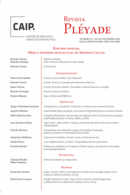
Published 2015-12-27
Keywords
- Ernesto Laclau,
- hegemony,
- populist reason,
- politics of rhetorics,
- transference and identification
How to Cite

This work is licensed under a Creative Commons Attribution-NonCommercial 4.0 International License.
Abstract
This text presents the work of the recently deceased political theoretician Ernesto Laclau within the Latin American context related to the crisis of Marxism, by the 1960 and 1970, in order to emphasize his singular elaboration of such a crisis. That would have taken him, along with Chantal Mouffe, to the formulation of a specific version of the theory of hegemony. However, this rhetorical displacement seems limited by Laclau’s homologation of the rhetorical constitution of the social, hegemony and the populist reason, since despite of the fact that his notion of populism is complex and historically informed, it remains a strategy for taking the State power even if not in a revolutionary way. Nonetheless, ours is not a critique of Laclau’s populism or populism in general. On the contrary, as a critique of the economy of transference and identification characteristic of his theory, we aim toward what could be considered a radical or savage populism, one that is not snared by the hegemonic dispute for State power while is still informed by the logic of antagonism.